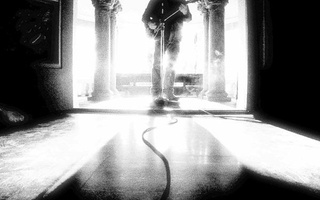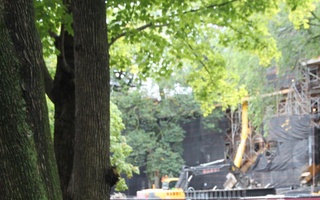
Vuvuzuelas, sold through the Silence Yale campaign run by Eric M. Cervini '14 and Johnathon H. Davis '14, are now banned from the 2010 Harvard-Yale football game.
The playing of vuvuzelas—those slender plastic horns that generated a buzz at the World Cup this summer—will not be allowed at the 127th football game between Harvard and Yale.
The Department of Athletics had previously said it intended to deal with the horns, which create a potentially disturbing noise, on a case-by-case basis at Saturday’s game.
“In keeping with Department of Athletics’ commitment to conduct athletic contests in a manner that promotes good sportsmanship, artificial noisemakers will not be permitted inside the ticketed footprint of Harvard Stadium,” wrote Associate Director of Athletics Timothy W. Wheaton in a statement on Tuesday.
The Undergraduate Council recently passed legislation recommending the ban to the Department of Athletics.
Oak Yard Representative Spenser R. Goodman ’14 introduced the vote after talking to Harvard’s football players and members of the band about the possibility of vuvuzelas being played at The Game.
“If you’re on offense, you can’t hear your own team,” Goodman said. “And the band members prepare for this game for a long time.”
Vuvuzelas create 127 decibels of sound, which is louder than a chainsaw, according to the BBC.
Dunster House UC Representative Annemette H. Harnes ’12 cited further problems with the vuvuzelas.
“There are going to be a lot of alums at The Game, and it would tarnish their experience,” Harnes said.
“Also, people might leave them, and it would be just another thing that would have to be cleaned up afterward.”
The Silence Yale Campaign, a movement for Harvard fans to play vuvuzelas at The Game, was initiated in October by Eric M. Cervini ’14 and Johnathon H. Davis ’14.
“We are disappointed by the sudden change in policy, and we hope that the Athletics Department will follow NCAA guidelines that permit the sensible use of artificial noisemakers during football games,” Cervini wrote in an e-mail.
Harvard’s football players will likely be glad about the ban, said Harvard tight end Nicolai F. Schwarzkopf ’11. “We definitely have other parts of the game that people want to hear besides a loud unbearable humming,” Schwarzkopf said. “You wouldn’t be able to hear the cheerleaders, the band. And there’s always Harvard chants, Yale chants—they’re all a part of The Game.”
Schwarzkopf also believes that the blare of the vuvuzelas would have had an effect on the performance of Harvard’s players.
“When the noise level increases, it makes it harder to hear plays and calls from other players on your team,” Schwarzkopf added. “We practice to overcome that noise. But the specific noise from these instruments shouldn’t be a part of the overall crowd noise. It’ll get loud enough without them, believe me.”
Read more in News
Monica Macovei Fights CorruptionRecommended Articles
-
 Young Returns to Relevance With ‘Le Noise’
Young Returns to Relevance With ‘Le Noise’ -
Making NoiseI. Two Images
-
Quincy Res. Dean Advises No Noise Complaints to HUPDQuincy House Resident Dean Judith F. Chapman sent out an email to the Quincy community this past Thursday requesting that students refrain from calling the Harvard University Police Department with noise complaints.
-
Policing PartiesIt is exceedingly clear that there ought to be formalized processes for issuing noise complaints against parties in the Houses.
-
 House Renovations Prompt Noise Complaints From Students
House Renovations Prompt Noise Complaints From Students -
MIT Leaders Lobby City Council Regarding Development in Kendall SquareMIT leaders, including President L. Rafael Reif, crowded into City Hall on Monday night to lobby the Council to support their plans for the university’s development in Kendall Square.













